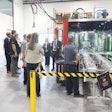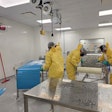Mars Petcare, the world's leading pet care company, is celebrating the 40-year anniversary of its Mattoon site – the company's first dry pet food manufacturing plant in the United States.
Located in Mattoon, Ill., the plant is the largest producer of dry pet food and care & treats in the company's North American network.The site produces several iconic pet food brands including PEDIGREE, DENTASTIX, IAMS and CESAR, among others. Products manufactured in Mattoon are distributed nationally to serve consumers in more than half of the country.
"We're proud to celebrate the Mattoon site's 40 years of operation and share this moment with our Associates and the greater community," said Mars Petcare Vice President of Supply Chain, Renee Peets. "The pet food industry continues to grow and evolve, and I feel very proud that our Mattoon site continues to deliver safe, high quality pet food to four-legged family members across the country."
Mars Petcare is committed to supporting job growth in the local Mattoon community. The site employs nearly 200 Associates from the area and receives 90 percent of its raw materials from partners within 150 miles of the city. Over the last ten years, Mars has invested over $90 million in the facility, including an expansion in 2013, adding 65,000 feet of manufacturing space as well as nearly 50 jobs.
The Mattoon manufacturing site also gives back to the community by supplying pet food to several local K-9 units and animal shelters. Additionally, through the company's Mars Volunteer Program, employees of the Mattoon site support many charitable organizations in the area, including the Coles County Animal Shelter.
"The Mattoon manufacturing site has been, and will continue to be, a bedrock of our community," said Mattoon Mayor, Tim Gover. "Through Mars Petcare's investments and charitable initiatives, the company has shown their support for our citizens, and we look forward to the next 40 years of partnership ahead."
The Mattoon site was commissioned in February 1977 and chosen for its proximity to two interstate highways, the availability of rail transportation and the abundance of grain-based materials. The facility officially opened its doors in June 1979.














